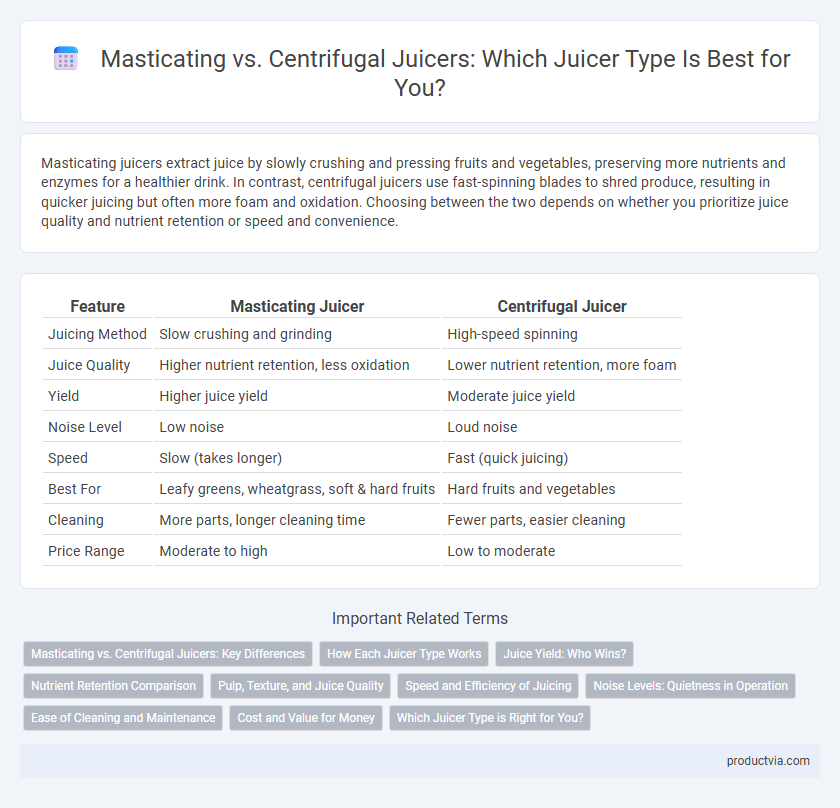Masticating juicers extract juice by slowly crushing and pressing fruits and vegetables, preserving more nutrients and enzymes for a healthier drink. In contrast, centrifugal juicers use fast-spinning blades to shred produce, resulting in quicker juicing but often more foam and oxidation. Choosing between the two depends on whether you prioritize juice quality and nutrient retention or speed and convenience.
Table of Comparison
| Feature | Masticating Juicer | Centrifugal Juicer |
|---|---|---|
| Juicing Method | Slow crushing and grinding | High-speed spinning |
| Juice Quality | Higher nutrient retention, less oxidation | Lower nutrient retention, more foam |
| Yield | Higher juice yield | Moderate juice yield |
| Noise Level | Low noise | Loud noise |
| Speed | Slow (takes longer) | Fast (quick juicing) |
| Best For | Leafy greens, wheatgrass, soft & hard fruits | Hard fruits and vegetables |
| Cleaning | More parts, longer cleaning time | Fewer parts, easier cleaning |
| Price Range | Moderate to high | Low to moderate |
Masticating vs. Centrifugal Juicers: Key Differences
Masticating juicers operate at slower speeds, which preserves nutrients and yields higher juice quality with minimal oxidation, ideal for leafy greens and wheatgrass. Centrifugal juicers run at high speeds, extracting juice quickly but producing lower juice yield and increased foam due to oxidation, suitable for harder fruits and vegetables. Choosing between masticating and centrifugal juicers depends on nutrient retention priorities and the types of produce frequently juiced.
How Each Juicer Type Works
Masticating juicers operate by slowly crushing fruits and vegetables to extract juice, preserving more nutrients and yielding higher juice quality with minimal oxidation. Centrifugal juicers use a high-speed spinning blade to shred produce, then separate juice through centrifugal force, resulting in faster juicing but often with increased foam and lower nutrient retention. Understanding these mechanical differences helps determine the best juicer based on efficiency, juice quality, and nutrient preservation.
Juice Yield: Who Wins?
Masticating juicers extract higher juice yield by slowly crushing and pressing fruits and vegetables, preserving more nutrients and reducing oxidation. Centrifugal juicers operate faster but tend to leave more pulp behind resulting in lower juice extraction efficiency. For those prioritizing maximum juice yield and nutrient retention, masticating juicers are the superior choice.
Nutrient Retention Comparison
Masticating juicers operate at low speeds, minimizing heat and oxidation, which preserves higher levels of vitamins, enzymes, and antioxidants compared to centrifugal juicers. Centrifugal juicers use high-speed spinning that generates heat and exposes juice to more oxygen, accelerating nutrient degradation and reducing overall nutrient retention. Studies show masticating juicers retain up to 40% more nutrients, making them ideal for health-conscious users seeking maximum nutritional benefits.
Pulp, Texture, and Juice Quality
Masticating juicers produce smoother juice with minimal pulp due to slow, cold-press extraction that preserves nutrient content and enzyme activity. Centrifugal juicers yield juice faster but often with more foam and coarser pulp, leading to reduced texture consistency and lower juice quality. The cold-press method of masticating juicers enhances flavor retention and shelf life compared to the oxidation-prone centrifugal process.
Speed and Efficiency of Juicing
Masticating juicers operate at slower speeds around 40-80 RPM, preserving nutrients and yielding higher juice extraction efficiency, especially from leafy greens and fibrous produce. Centrifugal juicers spin at high speeds of 6,000-14,000 RPM, delivering faster juicing but often sacrificing nutrient retention and producing more foam. For users prioritizing maximum juice yield and nutrient density, masticating models offer superior efficiency despite longer extraction times.
Noise Levels: Quietness in Operation
Masticating juicers operate with significantly lower noise levels, producing a quiet and steady hum ideal for early morning or late-night juicing without disturbing others. Centrifugal juicers tend to generate louder, high-speed noise due to their fast-spinning blades, making them less suitable for noise-sensitive environments. Consumers seeking a silent juicing experience typically prefer masticating models for their quietness in operation.
Ease of Cleaning and Maintenance
Masticating juicers typically require more time for cleaning due to their multiple parts and slower extraction process, but they often feature detachable components that can be rinsed easily. Centrifugal juicers usually have fewer parts and a straightforward assembly, enabling quicker cleaning, though pulp can get stuck in the mesh filter, necessitating thorough scrubbing. Maintaining a centrifugal juicer is generally simpler for everyday use, while masticating juicers demand more care to preserve optimal performance over time.
Cost and Value for Money
Masticating juicers typically cost more upfront but offer higher juice yield, nutrient retention, and longer durability, providing better value for money over time. Centrifugal juicers are generally more affordable initially but may produce lower-quality juice with less efficiency, potentially leading to greater long-term expenses due to wear and tear. Evaluating cost against juice quality and longevity helps determine the most cost-effective juicer choice.
Which Juicer Type is Right for You?
Masticating juicers operate at low speeds, preserving nutrients and producing higher juice yield, making them ideal for leafy greens and wheatgrass. Centrifugal juicers work faster with high-speed spinning blades, suited for hard fruits and vegetables but may generate more foam and oxidation. Choosing the right juicer depends on your produce preferences, desired juice quality, and preparation time.
Masticating vs Centrifugal for juicer type Infographic

 productvia.com
productvia.com